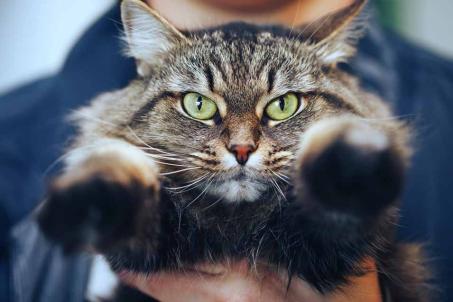
Like dogs, cats can suffer from separation anxiety, general anxiety, or anxiety triggered by specific events, such as: Thunderstorms, cat check-ups, new family members or sudden appearance in a new environment. Below are some tips and suggestions on how to calm a scared, stressed or even overexcited cat.
Understanding Cat Behavior: Anxiety, Fear, and Hyperactivity
Try to understand what makes your cats anxious so you can help them calm down and enjoy their purrfect life. It’s important to learn more about their nature and behavior so you can do your best to keep your cats calm and happy.
Fear of cats can have the following causes:
- Psychological triggers
- Lack of socialization
- Environmental factors: Loud noises, other animals, car rides, unfamiliar people, new environments.
The most common signs of cat anxiety include:
- Repetitive behaviors
- Avoidance: Stress can cause cats to avoid the litter box, especially if it’s located in an area they don’t like.
- Loss of appetite
- Aggressive behaviors
- Repetitive behaviors: scratching furniture, chewing on fabric, over-grooming, excessive meowing
Create a Relaxing Environment
One of the most important things for many cats is having a space of their own where they can hide when they’re scared. This is quite often a high perch, a window sill or maybe under a bed.
Provide your kitty with a small, quiet, dark space when they’re feeling overwhelmed. This safe space should include familiar smells, a cozy bed and their favorite toys.
Put On Soft Music or White Noise
Cats have very sensitive hearing and can find it stressful when strange things are happening outside (like storms and fireworks).
Music for cats can be better at reducing a cat’s anxiety levels. Cat music is within their frequency range and is similar to the rhythms that cats naturally communicate with. If you plan to use music to ease your cat’s anxiety, consider using speakers that specialize in playing cat music.
Create a Routine
Most cats love routine as it means they can predict what’s going to happen next. Feed them at the same time of day and keep their resources in the same place at all times. If they’re outdoor cats, let them out at the same time every day (and make sure they have access to a cat flap to keep to their kitten schedule!) . Schedule regular playtime into your routine and nap time when you’re both relaxing.
Introduce New Things Slowly
Cats like routine and are not big fans of change. Sometimes change can scare your cats, especially if they aren’t prepared and they find something new in their home that they feel they can’t escape. If you are planning on bringing a new baby into the house, rearranging furniture or even decorating, make sure you introduce your cats to the changes as slowly as possible so that they have time to adapt.
Make Time for Play and Interaction
Entertaining and playing with your cat is a great way to help them adjust to new places and eliminate boredom. Regular play also helps your cat become familiar with their new environment and socialize. Many cats respond better when they associate play and hospitality with a new area.
Cat toys with food rewards are especially helpful in calming your cat. Consider purchasing cat enrichment toys such as scratching boards or snuff pads. These are great for passing the time and providing a distraction from the stresses of the world.
If your cat doesn’t care for playtime but still enjoys human interaction, consider grooming sessions as an alternative. Cats like to feel in control and interact with humans on their own terms. Take their cue and they will let you know when they are ready to interact.
Use Catnip or Calming Products
When cats react to catnip, it causes them to feel increased happiness. Catnip sprays are a great solution for a stressed kitty. However, cats can get an upset stomach if they consume too much of it.
Over-the-counter products are also a good option for relieving your cat’s anxiety and do not need to be prescribed by a veterinarian. Some OTC products contain pheromones, which are species-specific chemical signals that can provide a feeling of security. Scientists have managed to synthesize these pheromones, which come in various forms, such as collars, sprays, wipes and plug-in diffusers.
Contact Your Vet
For cats with severe, crippling anxiety, long-term medication (given daily for months to years) is the best solution to make life more comfortable for them and their humans. Be sure to speak with your veterinarian about dosage and proper schedule for administering prescription medications. Some medications can take up to 6 weeks to see if they work in the cat. Medication should never be stopped suddenly. Talk to your veterinarian if you need to stop taking a medication for any reason.
